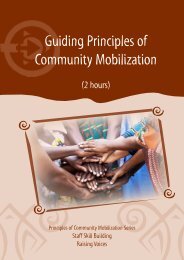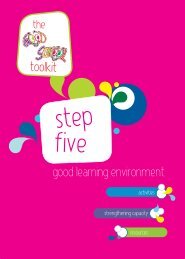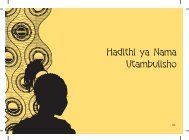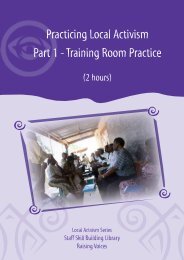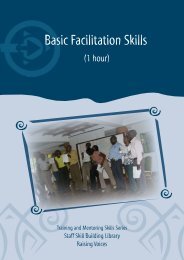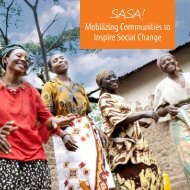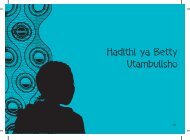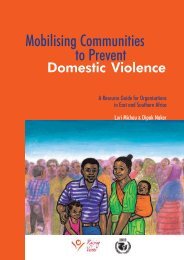Basic Monitoring Tools: Outcome Tracking Tool - Raising Voices
Basic Monitoring Tools: Outcome Tracking Tool - Raising Voices
Basic Monitoring Tools: Outcome Tracking Tool - Raising Voices
You also want an ePaper? Increase the reach of your titles
YUMPU automatically turns print PDFs into web optimized ePapers that Google loves.
<strong>Basic</strong> <strong>Monitoring</strong> <strong><strong>Tool</strong>s</strong>:<br />
<strong>Outcome</strong> <strong>Tracking</strong> <strong>Tool</strong><br />
(1 hour 30 minutes)<br />
<strong>Monitoring</strong> and Evaluation Series<br />
Staff Skill Building Library<br />
<strong>Raising</strong> <strong>Voices</strong><br />
<strong>Basic</strong> <strong>Monitoring</strong> <strong><strong>Tool</strong>s</strong>: <strong>Outcome</strong> <strong>Tracking</strong> <strong>Tool</strong> Module, <strong>Monitoring</strong> and Evaluation Series<br />
www.raisingvoices.org/staffskills.php<br />
i
SSASA! START PHA<br />
E<br />
This module is part of a Staff Skill Building Library developed by <strong>Raising</strong> <strong>Voices</strong>. The Library<br />
consists of competency based training modules designed to strengthen skills of staff<br />
implementing or supporting community-based violence against women (VAW) prevention<br />
programs. The Library is designed for organizations using SASA! An Activist Kit for<br />
Preventing violence against women and HIV but can be used by anyone working to mobilize<br />
their community to prevent VAW. If you are not using SASA!, simply replace the word SASA!<br />
wherever you see it in the text with the name of your methodology.<br />
This module is part of the <strong>Monitoring</strong> and Evaluation series in the Staff Skill Building Library.<br />
All materials in the Library can be downloaded at www.raisingvoices.org/staffskills.php or<br />
requested at info@raisingvoices.org The SASA! Activist Kit can be downloaded at<br />
www.raisingvoices.org<br />
© <strong>Raising</strong> <strong>Voices</strong> 2009<br />
All rights reserved<br />
Written by Sara Siebert with Lori Michau<br />
Artist: Marco Tibasima<br />
Designer: Samson Mwaka<br />
Photo courtsey of Emily Simon<br />
<strong>Raising</strong> <strong>Voices</strong><br />
Plot 16 Tufnell Drive, Kamwokya<br />
P.O. Box 6770<br />
Kampala, Uganda<br />
Phone: (+256) 41 4531186<br />
Fax: (+256) 41 4531249<br />
info@raisingvoices.org<br />
www.raisingvoices.org
<strong>Basic</strong> <strong>Monitoring</strong> <strong><strong>Tool</strong>s</strong>: <strong>Outcome</strong> <strong>Tracking</strong> <strong>Tool</strong><br />
(1 hour 30 minutes)<br />
Objective<br />
Understand how to accurately and uniformly use the <strong>Outcome</strong><br />
<strong>Tracking</strong> <strong>Tool</strong> and explain it to others.<br />
Competencies<br />
By the end of this session, participants will be able to:<br />
Use <strong>Outcome</strong> <strong>Tracking</strong> <strong>Tool</strong>.<br />
Explain to others how to use <strong>Outcome</strong> <strong>Tracking</strong> <strong>Tool</strong>.<br />
Cross-check similarity of rankings within same activity, between self and other staff.<br />
Preparations<br />
• Photocopy <strong>Outcome</strong> <strong>Tracking</strong> <strong>Tool</strong> forms (3 per participant).<br />
• Pre-arrange 2 staff volunteers to facilitate brief Quick Chat or poster facilitation sessions,<br />
and gather poster or needed materials—if possible, these can be staff who will not be<br />
filling out the <strong>Outcome</strong> <strong>Tracking</strong> <strong>Tool</strong> forms, so the ones who will be using it can practice.<br />
Brief volunteer facilitators that they should let the “community” talk a lot so people can<br />
easily fill out their forms.<br />
Staff Skill Building Library<br />
<strong>Basic</strong> <strong>Monitoring</strong> <strong><strong>Tool</strong>s</strong>: <strong>Outcome</strong> <strong>Tracking</strong> <strong>Tool</strong> Module, <strong>Monitoring</strong> and Evaluation Series<br />
www.raisingvoices.org/staffskills.php<br />
1
Steps<br />
Purpose and Form Overview<br />
1. Explain: The <strong>Outcome</strong> <strong>Tracking</strong> <strong>Tool</strong> is a form that only certain staff fills out for activities they monitor<br />
where the participants are community members (not Community Activist trainings, etc).<br />
2. Distribute <strong>Outcome</strong> <strong>Tracking</strong> <strong>Tool</strong> forms.<br />
3. Summarize and Explain: The <strong>Outcome</strong> <strong>Tracking</strong> <strong>Tool</strong><br />
helps us to track our impact in the community—whether<br />
people’s knowledge, attitudes, skills and behaviors are<br />
really changing over time.<br />
4. Ask: Not every staff member should fill out <strong>Outcome</strong><br />
<strong>Tracking</strong> <strong>Tool</strong> forms—why<br />
5. Summarize and Explain: If staff who are directly working<br />
with CAs to implement this program fill out the form, they<br />
may introduce bias. They may want to see progress, and<br />
it might be hard not to put that desire into what they are<br />
ranking on the forms. This is nothing personal—we all<br />
have this kind of bias about our own work.<br />
Activity <strong>Outcome</strong> <strong>Tracking</strong> <strong>Tool</strong><br />
Date: Activity: Strategy: Parish/Zone:<br />
Negative Statements / 1 2 3 4 Positive Statements /<br />
Resistant to SASA! ideas<br />
Accepting of SASA! ideas<br />
All participants Only a few Several Many<br />
seem resistant participants participants participants<br />
to SASA! ideas, question the support support<br />
no progressive status quo, progressive, progressive, Participants tend to say that:<br />
Participants tend to say that: voices. most are SASA! ideas / SASA! ideas<br />
resistant to and question and question<br />
SASA! ideas status quo status quo<br />
- violence is only physical - violence may be physical,<br />
emotional, sexual, economic<br />
- violence against women does not<br />
- violence against women has<br />
have negative consequences<br />
negative consequences<br />
6. Explain key components of the form, together as a group:<br />
• In this form, there are 4 main categories of things we want to influence in the community:<br />
knowledge, attitudes, skills and behaviors.<br />
• These categories link to the phases of SASA!—in Start and Awareness, we focus on knowledge<br />
and attitudes, in Support, we focus on skills, and in Action, we focus on behaviors.<br />
• Within each of those categories are certain statements or phrases that might be said in the<br />
community to indicate the level of someone’s knowledge, attitudes, skills, or behaviors. These<br />
statements are examples to help guide you, although of course you will probably not hear these<br />
said exactly like this by the community.<br />
• On the left side of the tool you will see statements that demonstrate resistance to SASA! ideas.<br />
On the right side of the tool you will see statements that demonstrate support of SASA! ideas.<br />
Between these is a spectrum from 1 to 4 with 1 being the closest to the resistant statements<br />
and 4 being the closest to the supportive or progressive statements. If the comments you hear<br />
from all the community participants are very resistant you would tick 1, if most but not all are<br />
resistant tick 2, when several community participants are supportive of SASA! ideas tick 3, when<br />
most community participants are supportive of SASA! ideas tick 4.<br />
Attitude<br />
Skills<br />
Behaviors<br />
Knowledge<br />
- women who experience violence<br />
are not at risk for HIV/AIDS<br />
Number of ticks:<br />
- some forms of violence against<br />
women are acceptable<br />
- men should have power over<br />
women in relationships<br />
- women and men should not<br />
share roles in their family and<br />
community<br />
Number of ticks::<br />
- there is no alternative to<br />
violence in relationships, it must<br />
be there<br />
- we should keep quiet if we know<br />
women experiencing violence<br />
- activists speaking out should<br />
be shunned<br />
Number of ticks:<br />
- they cannot balance power in<br />
their relationship<br />
- they must use / experience<br />
violence – it is unavoidable<br />
- they do not promote nonviolence<br />
in the community<br />
Number of ticks:<br />
1 2 3 4<br />
1 2 3 4<br />
1 2 3 4<br />
- women who experience violence<br />
are at risk for HIV/AIDS<br />
- violence against women is never<br />
acceptable<br />
- women and men should balance<br />
power in a relationship<br />
- women and men should<br />
share roles in their families and<br />
community<br />
- there are alternatives to violence<br />
in relationships, it does not have<br />
to be there<br />
- we should reach out to and<br />
support women experiencing<br />
violence<br />
- activists speaking out should be<br />
supported<br />
- that they do balance power in<br />
their relationships<br />
- they do not use / experience<br />
violence<br />
- they promote non-violence in<br />
their community.<br />
Staff Skill Building Library<br />
<strong>Basic</strong> <strong>Monitoring</strong> <strong><strong>Tool</strong>s</strong>: <strong>Outcome</strong> <strong>Tracking</strong> <strong>Tool</strong> Module, <strong>Monitoring</strong> and Evaluation Series<br />
www.raisingvoices.org/staffskills.php<br />
2
• The goal of our social change work is to help community members’ knowledge, attitudes, skills<br />
and behaviors to shift from 1’s to 4’s.<br />
7. Ask: Are there any questions about any part of this form—besides the rankings We will go through<br />
those in more detail.<br />
8. Respond to any questions about the form.<br />
Ranking <strong>Outcome</strong>s Accurately<br />
1. Explain: If we are going to be able to track progress, we need it to be so that when one person goes<br />
out and sees an activity, their ranking is quite close what another person would have put down.<br />
2. Distrbute blank <strong>Outcome</strong> <strong>Tracking</strong> <strong>Tool</strong> forms so that each participant has one.<br />
3. Explain:<br />
• We are going to pretend we are members of a community called SASA! City, so that we can<br />
see 2 activities. We do not have to travel far . . .SASA! City is very close. We have volunteers<br />
who will facilitate these activities. The rest of you will be playing community members, and then<br />
switching roles and filling out the <strong>Outcome</strong> <strong>Tracking</strong> <strong>Tool</strong> forms for the activity.<br />
• Please fill out the form after the activity, so we can talk about your rankings.<br />
• Just as a note—be a talkative community so it is easy to fill out these forms, for practice<br />
purposes—we’ll only spend about 5 minutes on the activity, and we need plenty of community<br />
comments to go on.<br />
4. Invite pre-arranged volunteer to<br />
facilitate a short (5 minute) Quick<br />
Chat or poster facilitation.<br />
5. Stop the volunteer after 5<br />
minutes, thank them for their<br />
participation, and give them a<br />
round of applause.<br />
Staff Skill Building Library<br />
6. Ask participants to take a few<br />
minutes to fill out the <strong>Outcome</strong><br />
<strong>Tracking</strong> <strong>Tool</strong>.<br />
7. Go over rankings together one by one.<br />
<strong>Basic</strong> <strong>Monitoring</strong> <strong><strong>Tool</strong>s</strong>: <strong>Outcome</strong> <strong>Tracking</strong> <strong>Tool</strong> Module, <strong>Monitoring</strong> and Evaluation Series<br />
www.raisingvoices.org/staffskills.php<br />
3
8. Ask: What did you rank Why<br />
9. Discuss rankings and let people know they can change them on their <strong>Outcome</strong> <strong>Tracking</strong> <strong><strong>Tool</strong>s</strong> if they<br />
wish. Ask people to be sure they have put their names at the bottom of the form, in the indicated<br />
space, and to hand in the forms.<br />
10. Repeat this process with a second activity and <strong>Outcome</strong> <strong>Tracking</strong> <strong>Tool</strong>.<br />
11. Repeat the ranking and debrief discussion.<br />
12. Answer any questions and iron out any issues.<br />
13. Ask people to hand in the second batch of forms and disribute another blank form that participants<br />
can take away with them.<br />
14. Remind staff that an action point<br />
after this training is to decide<br />
which staff will and will not use<br />
this form in their work. Emphasize<br />
that, even if they are not going to<br />
be regularly filling in the forms, it<br />
is good for everyone to be familiar<br />
with the forms and their use.<br />
15. Summarize and Conclude: The<br />
<strong>Outcome</strong> <strong>Tracking</strong> <strong>Tool</strong> is an<br />
important tool that helps us monitor<br />
our work. We’ll look at everyone’s<br />
rankings, and practice further out<br />
in the community. Do not hesitate<br />
to ask if there are questions as you<br />
begin to use these in activities.<br />
Validation Option: Activity in Training<br />
This activity allows for individual or group validation of<br />
the competencies:<br />
Use <strong>Outcome</strong> <strong>Tracking</strong> <strong>Tool</strong>.<br />
Cross-check similarity of rankings within same<br />
activity, between self and other staff.<br />
After the <strong>Outcome</strong> <strong>Tracking</strong> <strong>Tool</strong> forms are completed<br />
and submitted by each participant, the facilitator can<br />
look through the forms and compare with their own<br />
assessment of the mock activity. Are the forms filled<br />
out completely and correctly Are the rankings the<br />
same or similar between participants, and accurate<br />
to the quality of the mock activity If so, then the<br />
individual has demonstrated the competencies. If not,<br />
further training is recommended.<br />
Staff Skill Building Library<br />
Note: Local Activism: Practicing Local Activism, Part 2: Community Practice is a good follow up in which to<br />
continue to practice filling out the <strong>Outcome</strong> <strong>Tracking</strong> <strong><strong>Tool</strong>s</strong>.<br />
<strong>Basic</strong> <strong>Monitoring</strong> <strong><strong>Tool</strong>s</strong>: <strong>Outcome</strong> <strong>Tracking</strong> <strong>Tool</strong> Module, <strong>Monitoring</strong> and Evaluation Series<br />
www.raisingvoices.org/staffskills.php<br />
4
Validation Options<br />
Validation is another way to say “assessment” or “pre/post-test”. It is used to determine whether the<br />
participants in a training session learned what the facilitator intended for them to learn. Instructions<br />
for how to use each validation method can be found in Training Validation Methods: A how-to guide for<br />
assessing participant learning downloadable at www.raisingvoices.org/staffskills.php<br />
To use the table below, select one of the validation methods suggested with an “X”, for each<br />
competencylan time in the training agenda to use those methods to test the competencies listed.<br />
Note: This module includes a method for individual validation. Since individual validation is preferable<br />
to group validation, there are no group validation methods suggested for this module.<br />
Competency<br />
(Specific skill)<br />
Use <strong>Outcome</strong> <strong>Tracking</strong> <strong>Tool</strong><br />
(Optional- If Training of Trainers) Explain to<br />
others how to use <strong>Outcome</strong> <strong>Tracking</strong> <strong>Tool</strong><br />
Cross-check similarity of rankings within<br />
same activity, between self and other staff<br />
Suggested Validation Methods<br />
Individual Validation<br />
Use if essential for each participant to demonstrate<br />
the competency her/himself<br />
Activity in<br />
Training*<br />
X<br />
X<br />
Exit<br />
Interview/<br />
Role Play<br />
X<br />
Game Show<br />
(All Play)<br />
Written Quiz<br />
*Activity in Training includes many possibilities, depending on the module, including brainstorms, group practices, debates, agree/<br />
disagree/not sure exercise, and others. The Teach Back series can also be considered as an Activity in Training.<br />
Note: There are no validation questions needed for this module<br />
Staff Skill Building Library<br />
<strong>Basic</strong> <strong>Monitoring</strong> <strong><strong>Tool</strong>s</strong>: <strong>Outcome</strong> <strong>Tracking</strong> <strong>Tool</strong> Module, <strong>Monitoring</strong> and Evaluation Series<br />
www.raisingvoices.org/staffskills.php<br />
5
Photocopy<br />
Activity <strong>Outcome</strong> <strong>Tracking</strong> <strong>Tool</strong><br />
Date: Activity: Strategy: Parish/Zone:<br />
Negative Statements /<br />
Resistant to SASA! ideas<br />
Participants tend to say that:<br />
1 2 3 4 Positive Statements /<br />
Accepting of SASA! ideas<br />
All participants<br />
seem resistant<br />
to SASA! ideas,<br />
no progressive<br />
voices.<br />
Only a few<br />
participants<br />
question the<br />
status quo,<br />
most are<br />
resistant to<br />
SASA! ideas<br />
Several<br />
participants<br />
support<br />
progressive,<br />
SASA! ideas /<br />
and question<br />
status quo<br />
Many<br />
participants<br />
support<br />
progressive,<br />
SASA! ideas<br />
and question<br />
status quo<br />
Participants tend to say that:<br />
- violence is only physical - violence may be physical,<br />
emotional, sexual, economic<br />
Knowledge<br />
- violence against women does not<br />
have negative consequences<br />
- women who experience violence<br />
are not at risk for HIV/AIDS<br />
- violence against women has<br />
negative consequences<br />
- women who experience violence<br />
are at risk for HIV/AIDS<br />
Number of ticks:<br />
1 2 3 4<br />
Attitude<br />
- some forms of violence against<br />
women are acceptable<br />
- men should have power over<br />
women in relationships<br />
- women and men should not<br />
share roles in their family and<br />
community<br />
- violence against women is never<br />
acceptable<br />
- women and men should balance<br />
power in a relationship<br />
- women and men should<br />
share roles in their families and<br />
community<br />
Number of ticks::<br />
1 2 3 4<br />
Skills<br />
- there is no alternative to<br />
violence in relationships, it must<br />
be there<br />
- we should keep quiet if we know<br />
women experiencing violence<br />
- activists speaking out should<br />
be shunned<br />
- there are alternatives to violence<br />
in relationships, it does not have<br />
to be there<br />
- we should reach out to and<br />
support women experiencing<br />
violence<br />
- activists speaking out should be<br />
supported<br />
Number of ticks:<br />
1 2 3 4<br />
Behaviors<br />
- they cannot balance power in<br />
their relationship<br />
- they must use / experience<br />
violence – it is unavoidable<br />
- they do not promote nonviolence<br />
in the community<br />
- that they do balance power in<br />
their relationships<br />
- they do not use / experience<br />
violence<br />
- they promote non-violence in<br />
their community.<br />
Number of ticks:<br />
www.raisingvoices.org/staffskills.php



